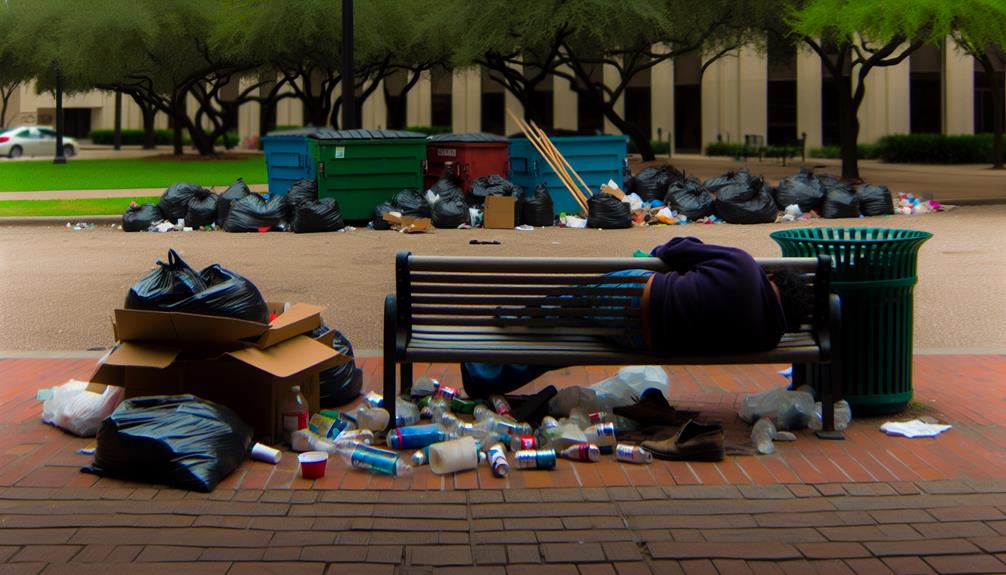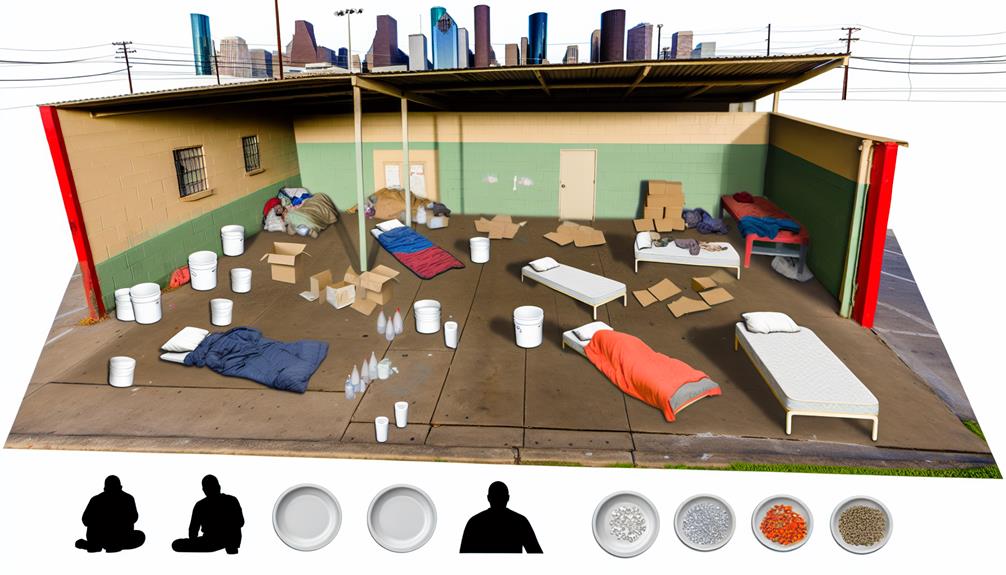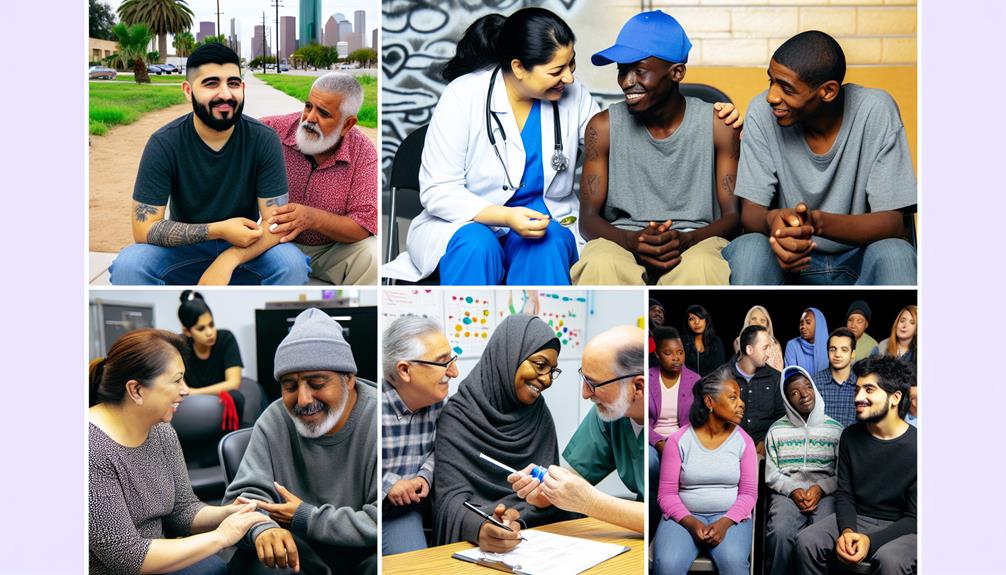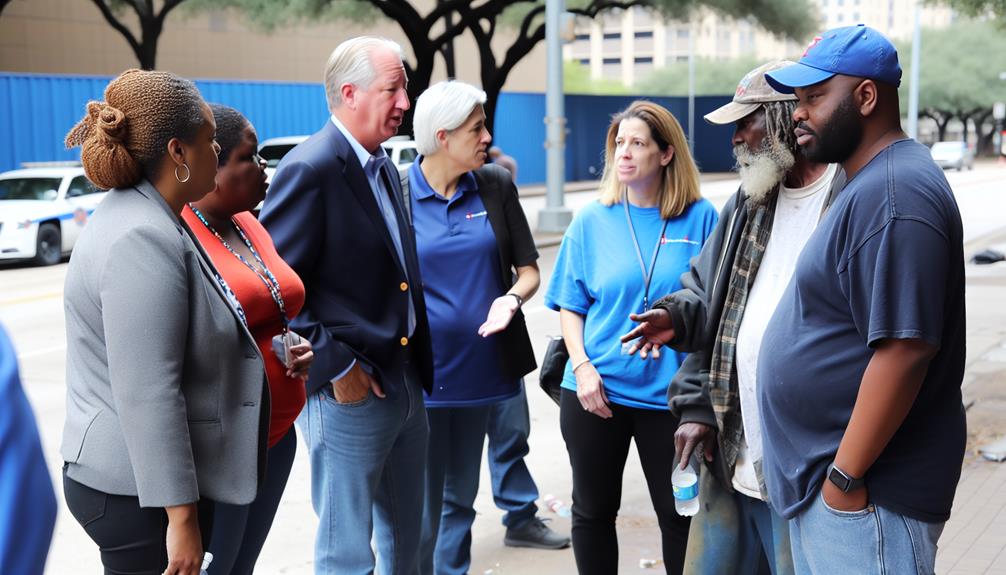Walking down the bustling streets of Houston, you can't help but notice the challenges faced by those experiencing homelessness. It's not just about lacking a roof over their heads; there are complex health issues at play.
Limited access to healthcare, mental health struggles, and the repercussions of substance abuse all intertwine to create a web of difficulties that demand our attention.
As we reflect on the root causes of these prevalent issues, a clearer picture emerges, emphasizing the need for comprehensive solutions.
Key Takeaways
Healthcare access in homeless communities is a real challenge due to limited facilities. Trauma rates are high among the homeless, affecting mental well-being significantly. The lack of specialized services for trauma makes it even harder for them. Housing instability further complicates matters by disrupting support networks and worsening mental health struggles. Exposure risks like extreme weather and poor sanitation also heighten health vulnerabilities in these populations.
Healthcare Access Barriers
Accessing healthcare is a real struggle for homeless folks in Houston. They face a bunch of hurdles like not having insurance, being short on cash, not having many healthcare spots around, and dealing with stigma. Without insurance, getting the care they need is tough. Money problems make it even harder to pay for doctor visits, meds, or treatments. Plus, there aren't many healthcare places in areas where lots of homeless people stay, so getting quick medical help is a challenge.
On top of all that, mental health problems make things even trickier. Lots of homeless folks don't get help for their mental health issues because it's tough to find mental health services. When substance abuse mixes with mental health troubles, it creates a cycle that stops homeless individuals from getting the right care. The shame tied to being homeless and having mental health problems stops many from seeking help, which just makes their health worse.
Mental Health Impact
Addressing mental health challenges among Houston's homeless community is crucial for breaking the cycle of homelessness and improving overall public health outcomes.
The trauma and stress faced while living on the streets can worsen existing mental health conditions, underscoring the necessity of accessible care to provide much-needed support for those in need.
Additionally, high rates of substance abuse disorders alongside mental health issues further emphasize the need for comprehensive and easily reachable mental health services in Houston.
Trauma and Homelessness
Homeless individuals often face a multitude of challenges, including high rates of trauma that can worsen mental health conditions like PTSD, depression, and anxiety. The experience of homelessness not only intensifies existing mental health issues but also creates significant obstacles to receiving proper care.
A lack of support services tailored to address trauma in the homeless community further compounds mental health struggles, perpetuating the cycle of homelessness. Effectively addressing trauma is crucial for improving mental health outcomes and breaking this cycle in Houston.
Access to Care
Navigating the mental health system in Houston can be really tough, especially for folks experiencing homelessness. Limited resources and support services make it even harder. The lack of affordable housing just adds to the already big mental health issues homeless people face here. On top of that, dealing with substance abuse problems makes it even more complicated to get the mental health care they need.
Conditions like schizophrenia, bipolar disorder, depression, and PTSD are all too common among Houston's homeless population, showing just how crucial it's to provide mental health support that fits their unique situations. Connecting mental health care with stable housing is key to breaking the cycle of homelessness and helping with mental health challenges in Houston.
We need to do more to make mental health care easier to access and to ensure that homeless individuals have a safe place to call home.
Housing Insecurity Effects

Dealing with housing uncertainty in Houston can really take a toll on your health and overall well-being.
When you don't have a stable place to stay, it opens you up to all sorts of health dangers, making any existing health issues worse and making it hard to get regular medical care.
The insecurity that comes with not having a proper home can mess up your support system, leaving you feeling even more alone and making it tough to tackle any health issues head-on.
Shelter Access
Navigating the challenges of finding stable shelter in Houston is a tough reality for many homeless individuals. The struggle is real due to the limited affordable housing options available, making it hard for those in need to secure a safe place to stay.
Economic factors only add to the difficulty, trapping folks in a cycle of homelessness. This instability not only perpetuates the issue but also takes a toll on public health. Without a stable home, it's tough for the homeless to address their physical and mental well-being effectively.
Tackling the shelter access problem is crucial to breaking this cycle and enhancing the overall quality of life for Houston's homeless community.
Health Impact
Living without a stable home in Houston takes a heavy toll on the health of the homeless community. Mental health struggles are exacerbated, and long-term health issues are added to the mix. The uncertainty of where to stay not only piles on stress but also makes it harder to get crucial medical help, leading to poorer health outcomes.
Homeless individuals in Houston face tough living conditions that raise their chances of getting sick or hurt. The cycle of losing housing and struggling to find stability makes it tough to manage ongoing health problems and mental health issues among the homeless. This sets off a harmful pattern of bad health outcomes, leading to more hospital stays and trips to the emergency room.
Environmental Exposure Risks
Living without a stable home in Houston exposes homeless individuals to harsh realities, increasing their vulnerability to environmental risks that directly impact their health and well-being. Extreme weather, poor sanitation, and exposure to pollutants all contribute to the challenges faced by Houston's homeless community. The absence of secure housing leaves individuals at the mercy of environmental hazards such as scorching heat, flooding, and contagious illnesses, compounding their already difficult circumstances. Homeless settlements in urban areas can worsen these risks, leading to various health issues and infections. Moreover, the lack of access to clean water, proper hygiene facilities, and healthcare services further complicates the lives of homeless individuals in Houston.
The environmental risks faced by the homeless population not only jeopardize their immediate health but also perpetuate the cycle of homelessness by hindering their efforts to regain stability. Addressing these challenges requires targeted interventions that offer safe shelter, clean resources, and tailored healthcare services to meet the unique needs of Houston's homeless population.
Substance Abuse Consequences
Substance abuse has serious consequences among the homeless population in Houston, leading to higher risks of infectious diseases and mental health issues. Many individuals turn to drugs and alcohol as a way to cope with the challenges of homelessness, creating a harmful cycle of addiction and declining health that not only affects them personally but also impacts public health overall.
- Increased Risk: Substance abuse weakens the immune system, making homeless individuals more vulnerable to infectious diseases like HIV/AIDS, Hepatitis B and C, and tuberculosis. The lack of access to proper hygiene facilities further heightens this risk.
- Mental Health Challenges: Substance abuse often goes hand in hand with mental health disorders, presenting a complex set of obstacles for homeless individuals. This dual burden can make it harder for them to seek assistance and establish stability in their lives.
- Obstacles to Healthcare: Dealing with substance abuse complicates the already difficult task of accessing healthcare services for the homeless in Houston. Limited resources and the stigma surrounding addiction make it challenging for this population to get the medical attention they need, resulting in higher rates of hospitalization and emergency room visits.
It is crucial to address substance abuse among Houston's homeless not only for their well-being but also to improve the overall public health landscape of the city.
Chronic Disease Prevalence
Dealing with chronic diseases like diabetes and hypertension is a major concern for the homeless community in Houston. Accessing proper healthcare services to manage these conditions is tough, leading to increased health risks.
Without consistent medical attention and preventive care, the impact of these ongoing illnesses is even more challenging for this vulnerable group.
Health Risks of Diabetes
Dealing with the high rates of diabetes among Houston's homeless community requires a comprehensive approach that covers healthcare services, stable housing, and nutritional support. Uncontrolled diabetes in homeless individuals can lead to serious complications like heart disease, kidney problems, and nerve damage.
The lack of access to healthcare and proper food makes managing diabetes while homeless even more challenging. People without homes who've diabetes often find it hard to keep track of their blood sugar levels and stick to their treatment plans.
To address the health dangers linked to diabetes in this vulnerable group, a well-rounded strategy involving medical support, secure living conditions, and nutritional aid is crucial.
Impact of Hypertension
Dealing with the high rates of hypertension among Houston's homeless community is a critical public health issue that requires tailored healthcare approaches and better access to medical services.
Hypertension is alarmingly prevalent among the homeless in Houston, surpassing the rates seen in the general population. Research shows that more than 30% of homeless individuals in Houston are affected by hypertension, highlighting a significant problem.
The lack of regular healthcare and preventative services worsens uncontrolled hypertension in this vulnerable group. Unmanaged hypertension significantly raises the risk of heart and other health complications for the homeless in Houston.
Tackling hypertension in this population calls for personalized healthcare strategies and improved accessibility to medical services to effectively address this chronic condition.
Shelter Conditions Impact

Living conditions in shelters have a huge impact on the health of homeless folks in Houston. The state of these shelters plays a big role in determining how healthy or sick individuals end up being. Let's break it down:
- Lack of Clean Facilities: When shelters don't have proper sanitation facilities, it puts homeless individuals at a higher risk of getting infectious diseases. Without clean restrooms and showers, it's tough for people to keep up with basic hygiene, making them more prone to getting sick.
- Crowded Spaces: Crowded shelters not only take away people's privacy and dignity but also make it easier for diseases like tuberculosis and respiratory infections to spread. Being in close quarters creates a perfect environment for illnesses to pass from one person to another, making the health of the homeless population even more precarious.
- Limited Clean Water and Ventilation: Without good ventilation and enough clean water in shelters, the chances of diseases spreading go up. Poor ventilation means more germs in the air, and a shortage of clean water makes it hard for people to stay clean, increasing the risk of infections.
Improving these shelter conditions is crucial to tackling the public health issues that homeless individuals face in Houston. It's not just about a roof over their heads; it's about keeping them safe and healthy.
Sanitation Facility Challenges
Living on the streets of Houston can be incredibly challenging, especially when it comes to finding clean and safe sanitation facilities. For the homeless population here, access to showers and toilets is limited, which poses serious health risks. Without regular access to proper hygiene facilities, the chances of infections and illnesses skyrocket among those experiencing homelessness in our city. Not only does this lack of sanitation impact personal cleanliness, but it also contributes to the spread of diseases and skin infections within homeless communities.
Moreover, the absence of adequate waste disposal options in homeless encampments creates a public health hazard and raises environmental concerns in Houston. The struggles associated with sanitation facilities make it difficult for homeless individuals to maintain basic hygiene practices, essential for their health and well-being. The risk of contracting diseases due to poor hygiene increases significantly without access to clean facilities, leading to common health issues like skin infections, gastrointestinal problems, and respiratory illnesses among the homeless population.
It is crucial to address the need for improved sanitation infrastructure to reduce the prevalence of hygiene-related illnesses and overall health risks faced by Houston's homeless community. By ensuring access to clean and safe sanitation facilities, public health initiatives can effectively combat preventable diseases and improve the well-being of individuals experiencing homelessness in our city.
Targeted Interventions Importance

Addressing the health needs of Houston's homeless population requires tailored solutions that directly target their unique challenges. Specific programs focusing on mental health, substance abuse, and chronic diseases can significantly enhance outcomes for individuals experiencing homelessness. Accessible healthcare services dedicated to addressing health issues related to homelessness are vital in improving the well-being of this vulnerable group.
Collaboration among public health agencies, nonprofits, and healthcare providers is essential for the successful implementation of effective interventions. By working together, these organizations can ensure that homeless individuals receive the support they need to overcome health obstacles and regain stability in their lives.
These targeted interventions not only address immediate health concerns but also aim to prevent future health issues among the homeless population. Through personalized healthcare services, mental health resources, and substance abuse programs, individuals experiencing homelessness can receive the necessary care to lead healthier lives. Prioritizing targeted interventions is a crucial step for Houston in tackling the public health challenges faced by its homeless population.
Support Services Necessity
In my experience working with Houston's homeless community, I've seen firsthand the vital role that support services play in addressing their health needs. It's not just about medical care; it's about providing a helping hand to those facing barriers in accessing healthcare, mental health support, and addiction treatment.
Services like case management, peer support, and outreach are lifelines for connecting homeless individuals to the essential resources they need. These interventions make a real difference in managing both physical and mental health challenges, ultimately breaking the cycle of homelessness. By offering a supportive hand, we can improve overall well-being, prevent the spread of diseases, and address public health issues affecting this vulnerable population.
Being out there in the field, interacting with individuals facing these challenges, has shown me the significant impact that these support services have on their lives. It's about more than just providing healthcare; it's about offering a compassionate and understanding approach to help them navigate through tough times. The human connection and support services go hand in hand in transforming lives and creating a healthier community for everyone.
City's Role in Addressing Challenges

Houston is really stepping up to help the homeless community tackle their health challenges. It's not just about policies and money – the city is all in, working with health organizations to provide top-notch care and support.
They're teaming up with healthcare providers, shelters, and advocates to make sure the homeless get the help they need. It's heartening to see such dedication to improving the well-being of those in need.
Frequently Asked Questions
Why Do Homeless People Have Health Issues?
Facing health challenges while experiencing homelessness often stems from limited access to healthcare, substance abuse issues, past trauma, high stress levels, and inadequate living conditions. These factors can lead to untreated medical issues, mental health concerns, long-term illnesses, and premature death within the homeless community.
What Are the Health Issues in Houston?
In Houston, many homeless individuals struggle with conditions like schizophrenia, bipolar disorder, depression, and PTSD. Substance abuse often complicates these issues, making it harder to overcome. Mental health plays a significant role in finding stable housing, leading to a cycle of homelessness and declining well-being. Limited access to healthcare services further compounds these challenges, making it tough for those in need to get the support they require.
What Is the Cause of Homelessness in Houston?
Facing homelessness in Houston has become a harsh reality for many, with soaring living costs and limited support adding to the challenge. Structural issues like racism only make matters worse, intensifying the struggle to find stable housing. The impact of childhood housing instability on long-term health cannot be ignored. Sadly, homelessness in Houston is linked to increased mortality rates, chronic illnesses, and mental health issues. The situation paints a bleak picture of the difficulties and hardships faced by those without a place to call home.
What Are the Three Major Health Problems That Are Found Among the Homeless Population?
In Houston's homeless community, many individuals struggle with mental health issues like schizophrenia, bipolar disorder, and depression. Often, these challenges are accompanied by substance abuse disorders and PTSD. It's crucial to address these complex issues to provide comprehensive healthcare for those in need.
